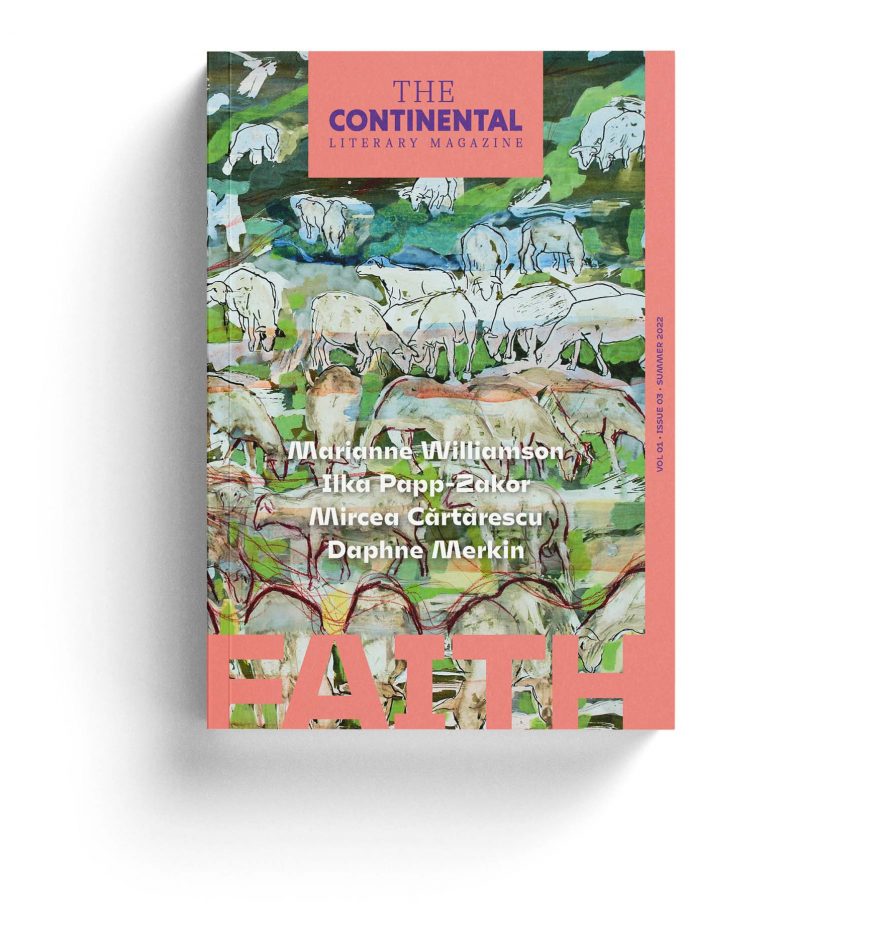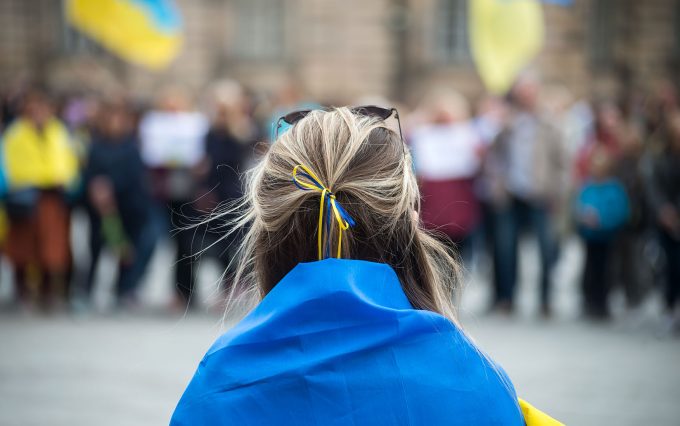
2nd June 2022
Non-Fiction
6 minutes read
Ukrainian Women Poets: Foreword

2nd June 2022
6 minutes read
In a foreword to our Ukrainian women poets, Olesya Khromeychuk & Uilleam Blacker ask, how can faith, hope, and love live in a space of pain?
Fides, Spes, Caritas—the story tells us—were young girls, martyred in front of their mother, Sophia. They were ordered to forgo their belief and, instead, to accept one imposed by the emperor. When they disobeyed the order, they were tortured. Much to everyone’s surprise, they survived the torture with defiance. The raging emperor commanded that the girls be beheaded, believing that in death he would defeat Faith, Hope, Love, and, by making her watch the children suffer, injure their mother, Wisdom.
The feelings we associate with violence are the polar opposites of those represented by the martyred saints: betrayal, despair, hatred, and madness. Betrayal of humanity by those who choose to inflict death. Despair experienced by those who are left to die in besieged cities. Hatred felt by those who destroy, and by those who endure and witness the destruction. Madness as an excuse used to explain war crimes. Madness that can be brought about by grief. Madness of those who witness atrocities and remain silent. How can faith, hope, and love live in a space of pain? How can wisdom guide us through war?
Vira (faith), Nadiia (hope), Liubov (love), Sofia (wisdom), all popular women’s names in Ukraine, are virtues essential for survival. It takes great wisdom to have faith in the future when the world around you is on fire, to hope amongst total despair, and to love as strongly as you hate. To love life as you grieve every loss. To love your city as you see it devastated. To love freedom so strongly, as it is being torn out of your hands, that your love becomes lethal to the enemy. Healing hatred, lethal love. War makes the inconceivable real.
War turns meanings upside down. It turns language inside out: “we’re bringing peace to all people / a black sun shines even in the dark” says Iya Kiva’s narrator, as she sews a fascist flag, speaking of peace while being coopted for war. The list goes on: attack is defense, oppression is protection, enslavement is liberation, subjugation is freedom.
For those faced with aggression, this disorientation prompts a reevaluation of fundamental concepts: love, hope, faith, hate, freedom. Poetry becomes a tool that can restore meanings that are twisted or turned upside down. For Kateryna Kalytko, responding to war in poetry means the “rediscovery” of words and of naming things properly as a means of self-preservation:
Look, this is love. I am still alive.
This is the time where everything receives a name.
Here is the shelter in the very heart of the language
Into which you will enter.
Love, survival, and the power to speak are intertwined. The shelter of language is not easy to access, however. For Iryna Shuvalova, the poet is a “graduate/of the high school of powerlessness”. “Scream all you want/poet,” she warns, “death can’t hear you/either way.” Yes, language should be the instrument of truth, of testimony, of witnessing. But in the face of this, can it be so? How does a mother bear witness to the murder of children?
you thrust that language of yours everywhere
like a dirty finger into a wound
to convince yourself
to testify
the way a broken carafe testifies
to the existence of water
a broken radio witnesses
the mystery of electromagnetism
Can poetry speak of atrocity? Or, in its helplessness and inadequacy, does it simply speak of its own limitations?
Theodore Adorno’s statement on the “barbarity” of poetry after the atrocities of Auschwitz was always more of an ethical challenge than a prohibition. Some say that great poets of the Holocaust like Paul Celan or Nelly Sachs proved Adorno wrong by reclaiming the German language to write about the Holocaust. But perhaps Celan and Sachs were simply rising to Adorno’s challenge.
Celan, born in 1920 in Romanian Cernăuți, now Chernivtsi in western Ukraine, knew what it meant to live under war, terror, and the mutilation of language. His own language goes through disintegration and pain, it confronts horror and its own helplessness and remakes poetry in a scorched place. Adorno called for the rejection of catharsis and easy redemption in poetry and the acknowledgement of the “shame of art” in the face of suffering. This is precisely what Celan’s work does.
Celan’s compatriots, today’s Ukrainian poets, are facing the same problems, and their responses are just as uncompromising. The sense of the inadequacy of language that comes with witnessing atrocity does not make poetry weak. As Oksana Maksymchuk suggests, it is a place from which unexpected strength arises. Poems are:
Helpless yet
busily resilient
they form like clouds
woven of gauze and mucus
dealing in recovery of broken
hope, delivery of the forgotten
Poetry heals, but that healing is not passive, nor even necessarily gentle. Poetry goes through the hellish fire of war, with all its tortured meanings, and emerges, tempered like steel, as Shuvalova suggests:
so grant us our lord
tongues of iron
that we might lick clean
these roads
this asphalt
lick them free of all trace of our foes
lick them clean of all splattered blood
leaving untouched
only that one little crack
where a thick
green stem
stubbornly pushes upward
For Shuvalova, the green shoot of rebirth is not something that is given to us. It grows only after we have developed iron tongues and licked away the traces of the enemy. Only after we have withstood atrocity, the murder of children, the mutilation of love, faith, hope. This green shoot of hope is no cliché: it has conditions. “And where the earth burned, pity or forgiveness won’t grow,” Marianna Savka tells us. Poetry expunges the perpetrator, but it does not forgive, does not redeem.
Like Shuvalova, Savka turns towards God, who gives her “permission not to forgive/And tells everything like it is.” Poetry is not about making things easy for anyone, least of all the perpetrator. The poet’s tongue has difficult work to do. It must become hardened, harsh, even brutal. Its lethal love, its healing hatred and its bitter faith will force open a space for hope to grow.
Much like Wisdom watching her children tormented, the Ukrainian women poets presented here have faith in their country’s defiance in the face of Russian aggression. By reading their work, we bear witness to this war too, and in doing so we participate in the reforging of the meaning of love, faith, hope; we become wiser.







